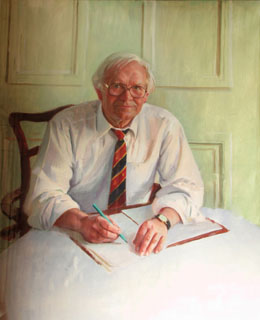Alumnus Sir James Black passes away aged 85
 Sir James Black, the Nobel laureate and an alumnus of the University of St Andrews, has died at the age of 85 after a long illness.
Sir James Black, the Nobel laureate and an alumnus of the University of St Andrews, has died at the age of 85 after a long illness.
Sir James is credited with the invention of beta-blockers, a milestone in pharmacology which has saved and transformed the lives of millions.
Born in Lanarkshire and educated at Beath High School in Cowdenbeath, he won a scholarship to study Medicine at St Andrews, graduating from the University in 1946. He met his future wife, Hilary Vaughan, in St Andrews where she was studying Biochemistry. The couple married shortly after James’ graduation.
Sir James worked briefly in the physiology department in St Andrews before moving abroad.
During a hugely distinguished career he held posts in academia and industry and was Chancellor of the University of Dundee from 1992 to 2006.
Sir James’s discovery of the drugs propranolol and pronethalol which work by blocking the body’s own response to stress hormones in the early 1960s revolutionised the way doctors helped heart patients.
Although he is best known for his work on drugs which regulate the heart, Sir James also made significant discoveries in the development of drugs to treat heartburn and ulcers.
He was awarded a Nobel Prize for Medicine in 1988 for his work on drug development. Sir James was knighted in 1981 and in 2000 was appointed to the order of Merit. He was awarded an Honorary Degree by St Andrews in 1985.
The University of St Andrews has recently established the Sir James Black Chair of Medicine in his honour and expects to make the first appointment to this prestigious post later this year.
The University flag will fly at half-mast this week as a mark of respect.
Professor Hugh MacDougall, Dean of Medicine in St Andrews, said:
“James Black was awarded a scholarship to study medicine in St Andrews at the age of 15 whilst a pupil at Beath High School, Cowdenbeath. He came up in war time Scotland and lived first in St Salvator’s Hall where his portrait hangs today.
“Perhaps never has such a scholarship been more worthwhile as his subsequent career in drug development resulted in the beta blockers and in the 5HT3 antagonists, the effects of which have improved the lives of millions of people around the world.
“The University has recently named a new Chair in Medicine in his honour to be established in the new School of Medicine. The University and the Bute Medical School mourn the passing of this great alumnus, an iconic leader in medicine.”
Category University news